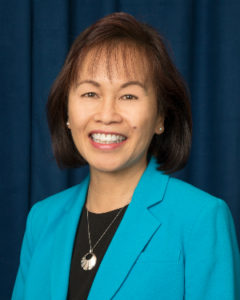Nolan Chang, MD, shares ways Kaiser Permanente is using AI to better the patient experience and reduce physician burnout.
Health care experts discuss the promise of value-based care

Permanente physician leader Nancy Gin, MD, FACP, recently moderated an expert panel discussion published in The Permanente Journal on the meaning and promise of value-based care. The panel exchanged views on how value-based care has evolved since the term was first coined 17 years ago, including its impact on quality of care and outcomes, its role in patient experience, its effect on payment models, and more.
Dr. Gin is executive vice president of quality and chief quality officer for The Permanente Federation. Joining her were panelists Richard J. Baron, MD, MACP, president and CEO of the American Board of Internal Medicine (ABIM) and the ABIM Foundation; Ann Greiner, MCP, president and CEO of the Primary Care Collaborative; and Joshua M. Liao, MD, MSc, FACP, associate chair for health systems and professor of health systems and population health with the University of Washington.
Each panelist brought a unique expertise and viewpoint to the dialogue, revealing the many nuances surrounding the meaning and purpose of value-based care. Dr. Baron noted that it has had different expressions in the form of care delivery models designed to help clinicians take more responsibility for the resources used care for patients.
Related value-based care story: Ramin Davidoff, MD, on the benefits of integrated, value-based care
Panelists discussed both the merits and criticisms of value-based care. Dr. Liao pointed out that in European and Asian countries, some health care systems using fee-for-service models have produced better quality and health outcomes than the United States, which remains largely fee-for-service. “This distinction — whether fee-for-service itself, or how fee-for-service has been operationalized within the broader financing and health care budgeting method — is the issue,” Dr. Liao said.
Ann Greiner cited the higher life expectancies in other countries as another example of where the American health care system is falling short. “We here in the United States trail the Europeans by 3 years in terms of life expectancy, and we spend over 18% of our gross national product, much more on a percentage basis than our European counterparts. We are clearly not getting value,” Greiner said.
Panelists also discussed the financial strain that health care institutions experienced during the COVID-19 pandemic, which Dr. Liao suggested changed the trajectory of the growth of value-based care. “Prior to 2020, the expectation was that health care in the United States was arching toward value-based care,” he said. “Because of COVID-19, that arc seems to have taken a turn, and some expectations lost.”
Related value-based care story: Maria Ansari, MD, talks value-based care, physician burnout
The panelists took turns talking about how patient perceptions are an important consideration in measuring the effectiveness of value-based care. Although patients may not always fully comprehend how value-based care benefits them, the panelists felt that moving away from fee-for-service models can benefit communities to create a “win-win,” according to Dr. Gin.
Dr. Baron weighed in on the patient’s perception of value. “I think insurance insulates people from having to figure out how they would actually benefit from lower cost. Ultimately, that insulation pushes people and health systems towards high-cost care.”
The group largely agreed that the fee-for-service health care system in the United States is failing patients. “We’re putting so much money into health care that we ought to be able to do a whole lot better than we are now,” said Dr. Baron. “I do think there is a lot of progress that can be made on the delivery-system side despite how far we’ve come.”
The panelists concluded that, despite valid criticisms, continuing to advance the current understanding of value-based care is crucial.
Note: Read the full expert panel discussion in The Permanente Journal.


